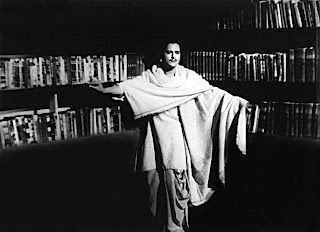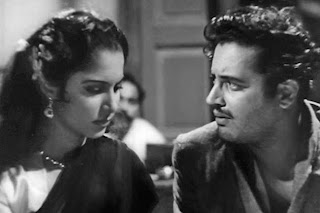A Potpourri of Vestiges Review
Pyaasa’s intense and thought-provoking plot emphasizes on the fact that every human being, howsoever wretched or deplorable, is capable of love and worthy of being loved. The movie also underlines the root cause of human plight: poverty, not of material but of thought. Guru Dutt, touted in film circles as India's Orson Welles, demonstrates in Pyaasa the might of words—an embodiment of human thought—as great stimuli for change. The stark theme of Guru Dutt’s Pyaasa is highly reminiscent of Dostoevsky’s Notes from Underground. The vituperative and somber tone of Vijay’s poetry seems to betray the same sense of angst and guilt as that of Dostoevsky’s Narrator.
Vijay’s apparent anger for society’s hypocritical rigidity is indicative of his inner sense of chagrin for having failed in his efforts to be loud enough to be heard and for quietly accepting his fate. Pyaasa also highlights the complexities associated with the human psyche that give rise to unpredictability of behavior: Vijay, rejected by his lover (Mala Sinha) and family, is embraced by a prostitute, Gulabo (Waheeda Rehman) who is moved by the power of his poetry. While the world finds her despicable and treats her with contempt, she seems to be the only soul capable of reciprocating love and respect. It’s both touching and mesmerizing to witness two pariahs of the society finding refuge in each other’s abject solitude.
As far as the source of Pyaasa's plot is concerned, it’s surmised that the movie’s story is loosely based on renowned lyricist Sahir Ludhianvi’s failed affair with poetess and writer Amrita Pritam. Sahir Ludhianvi’s evocative poetry adds real charm to S. D. Burman’s soothing music, and indeed it’s this synergy that livens up the movie’s tempo in spite of its somber theme. The relentless questions that the movie poses to the viewer have the power to make a Polymath look askance at the pool of his knowledge and a Saint jitter in morbid terror. V. K. Murthy’s detailed cinematography inexplicably reminds one of Gregg Toland’s avant-garde, supernal camera-maneuvering techniques in Welles’ magnum opus Citizen Kane. The movie’s relatively inexperienced cast, hand-picked by Guru Dutt himself, makes most of the opportunity at disposal with almost everyone delivering a memorable performance with special mention of Johnny Walker, Mala Sinha, Waheeda Rehman and Mehmood. The Hindi word ‘Pyaasa’ translates to ‘Thirsty’ in English; the movie’s plot is highly symbolic of the thirst that troubles the protagonist in form of his yearnings, which gradually take the form of angst and malaise owing to society's indifference and his continuous failure.
Overall, Pyaasa is a formidable work of cinema that presents cinema at its finest by maintaining a delicate balance between art and entertainment, thereby serving to be a unique specimen of filmmaking. The movie also marked the beginning of somewhat scandalous association between Guru Dutt and Waheeda Rehman (a lot has been conjectured about Dutt's extra-marital relationship with Rehman... it's still a mystery whether the lovelorn Guru Dutt died of an accidental drug overdose or did he commit suicide). Pyaasa fulfills in its absolute sense the true purpose of cinema: to entertain and enlighten simultaneously. The movie is a must watch for all those who understand and appreciate thought-provoking cinema, and is a great means to get acquainted with Guru Dutt’s oeuvre and also with the Classic Indian Cinema.
Readers, please feel free to share your opinion by leaving your comments. As always your feedback is highly appreciated!
 |
| Pyaasa (1957) - By Guru Dutt |
Our Rating: 9.0
IMDb Ratings: 7.8
Genre: Drama | Music | Romance
Cast: Mala Sinha, Guru Dutt, Waheeda Rehman
Country: India
Country: India
Language: Hindi
Runtime: 146 min
Color: Black and White
Pyaasa is a 1957 Drama movie directed and produced by arguably the greatest Indian filmmaker of all time, Guru Dutt. Dutt, who pioneered the integration of songs in the movie's narrative as well as the use of close-up shorts in Indian Cinema, is ubiquitously regarded as one of the most influential film-makers of his time. Dutt's avant garde works and his unique style of film-making have been a subject of discussion in various acting and film institutes all across the globe for well over five decades. In Pyaasa, Guru Dutt presents the poignant tale of a struggling poet ostracized by a hypocritical society that faces no qualms in immortalizing the dead, but finds it outlandish to exalt the living. Vijay, educated yet unemployed, epitomizes the hapless state of the Indian youth in the post-colonial India
Pyaasa, widely regarded as Dutt’s magnum opus, represented a departure from the traditional style of film-making in the Indian Cinema, for it blurred the line that hitherto separated art cinema from commercial cinema. With Pyaasa, Guru Dutt demonstrated for the first time, to both his audience and fellow film-makers, how a balance could be struck between creative aspirations and commercial requirements—a success formula that was completely unknown at that time. Pyaasa, along with Guru Dutt’s autobiographical Kaagaz Ke Phool, is currently included in the list of all time greatest motion pictures, both by Time magazine's "All-TIME" 100 best movies and by the Sight & Sound critics' and directors' poll.
 |
| Guru Dutt in Pyaasa |
 |
| Waheeda Rehman in Pyaasa |
 |
| Guru Dutt as the ostracized poet Vijay in Pyaasa |
 |
| Mala Sinha in Pyaasa |
 |
| Waheeda Rehman and Guru Dutt in Pyaasa |
Readers, please feel free to share your opinion by leaving your comments. As always your feedback is highly appreciated!
For more information on the title, please click on the following links:
People who liked this also liked...


Excellent movie
ReplyDeleteIndeed!!!
Deletenice description of a great movie by great director...dis was followed by kagaj k phool which was the last movie by guru dutt as a director..
ReplyDeleteThanks for gearing me on to watch this magnificent specimen of movie-making!
DeleteHaven't watch many Indian movies of 50s/60s, so I will definitely watch this on your recommendation.
ReplyDeleteWell. you wouldn't regret it :-P
DeleteSimply superb, Mindblowing movie..
ReplyDeleteThis is a cinema which is boon to cinelovers.A must watch
Became a huge fan of Gurudutt after watching this.
Thanks a lot for sharing your valuable thoughts! Pyaasa is indeed a masterpiece and Guru Dutt an auteur par-excellence.
Deletenice review :)
ReplyDeleteI am glad that you liked it :-)
ReplyDeleteIndeed ....... Pyaasa entertains with enlightenment ....I watched it many times and every time I watched I feel enriched .
ReplyDeleteIts a journey from materialistic world towards the enlightened one ....journey from hatred to love and forgivness ...it introduced us with bitter truth of society. ....people often say that pyaasa is somewhat depressive movie but i dnt think so. ...but the final rejection of the society by poet Vijay is the start of new hope towards making a new good society.....of love and peace ..Being a huge fan of Guru Dutt ji ....I feel very sad that we lost this kind of genius untimely ....
Pyaasa is the must watch movie